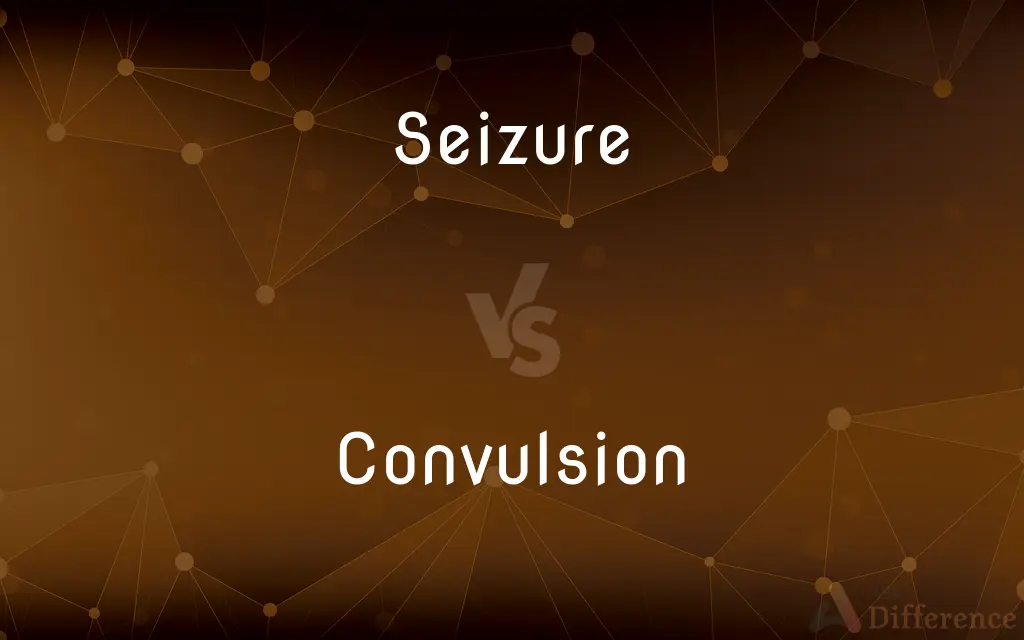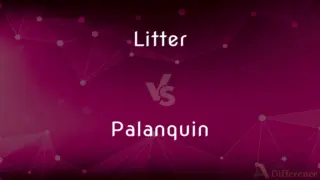Seizure vs. Convulsion — What's the Difference?
By Tayyaba Rehman & Maham Liaqat — Updated on March 18, 2024
Seizure focuses on abnormal brain activity affecting consciousness or actions, while convulsion involves visible, involuntary muscle contractions.

Difference Between Seizure and Convulsion
Table of Contents
ADVERTISEMENT
Key Differences
Seizures encompass a broad range of neurological anomalies that may or may not include muscle contractions, affecting consciousness, sensations, and actions due to abnormal brain activity. On the other hand, convulsions specifically refer to the visible and often violent involuntary muscle contractions and can be a symptom of a seizure or other medical conditions.
Seizures can occur without any visible signs, impacting the individual internally through sensations, emotions, or loss of consciousness. Whereas, convulsions are always evident externally through uncontrollable muscle movements, making them more noticeable to an observer.
The causes of seizures are diverse, ranging from epilepsy, febrile seizures in children, to head injuries and infections. Convulsions, while often a symptom of seizures, can also result from other conditions such as electrolyte imbalances or high fever, indicating a broader range of causes.
Treatment for seizures may involve medications, dietary changes, or even surgery, aimed at controlling or reducing the frequency of seizures. In contrast, treatment for convulsions focuses on the underlying cause, whether it be managing a fever or addressing epilepsy.
Diagnosing seizures often involves an electroencephalogram (EEG) to monitor brain activity, along with medical history and a physical exam. Convulsions are diagnosed based on their physical manifestation and the circumstances under which they occur, with further testing to identify their cause.
ADVERTISEMENT
Comparison Chart
Definition
Abnormal brain activity affecting consciousness or actions.
Visible, involuntary muscle contractions.
Symptoms
Can be internal (sensory, emotional) or external (movements).
Always external, noticeable through muscle movements.
Causes
Epilepsy, febrile seizures, head injuries, infections.
Can be symptom of seizures, fever, electrolyte imbalances.
Treatment
Medications, dietary changes, surgery.
Treat underlying cause; may include fever management.
Diagnosis
EEG, medical history, physical exam.
Physical observation, medical history, further testing.
Compare with Definitions
Seizure
Diagnosed through EEG and patient history.
Her diagnosis was confirmed after an EEG showed abnormal brain activity.
Convulsion
Can occur as a result of various conditions.
High fever in children sometimes leads to convulsions.
Seizure
Treatment aims at controlling episodes.
Medication has helped reduce the frequency of his seizures.
Convulsion
Treatment depends on the cause.
Cooling measures were effective in stopping the fever-induced convulsions.
Seizure
May or may not include physical convulsions.
She experienced a seizure with no convulsions, just a staring spell.
Convulsion
A specific symptom involving muscle contractions.
The sudden convulsions frightened those around her.
Seizure
A disturbance in the electrical activity of the brain.
After the seizure, he felt confused and tired.
Convulsion
Visible and often violent.
The convulsions shook his entire body uncontrollably.
Seizure
Can affect consciousness, behavior, and sensations.
During his seizure, he was unaware of his surroundings.
Convulsion
Diagnosis focuses on underlying cause.
Blood tests were conducted to find the cause of her convulsions.
Seizure
A seizure, formally known as an epileptic seizure, is a period of symptoms due to abnormally excessive or synchronous neuronal activity in the brain. Outward effects vary from uncontrolled shaking movements involving much of the body with loss of consciousness (tonic-clonic seizure), to shaking movements involving only part of the body with variable levels of consciousness (focal seizure), to a subtle momentary loss of awareness (absence seizure).
Convulsion
A convulsion is a medical condition where body muscles contract and relax rapidly and repeatedly, resulting in uncontrolled shaking. Because epileptic seizures typically include convulsions, the term convulsion is sometimes used as a synonym for seizure.
Seizure
The act or an instance of seizing or the condition of being seized.
Convulsion
An intense, paroxysmal, involuntary muscular contraction.
Seizure
A sudden attack, spasm, or convulsion, as in epilepsy or another disorder.
Convulsion
An uncontrolled fit, as of laughter; a paroxysm.
Seizure
The act of taking possession, as by force or right of law.
The seizure of a thief, a property, a throne, etc.
The search warrant permitted the seizure of evidence.
Convulsion
Violent turmoil
"The market convulsions of the last few weeks have shaken the world" (Felix Rohatyn).
Seizure
A sudden attack or convulsion, (e.g. an epileptic seizure).
He fell to the floor and convulsed when the epileptic seizure occurred.
Convulsion
(medicine) An intense, paroxysmal, involuntary muscular contraction.
Seizure
A sudden onset of pain or emotion.
He felt the sudden seizure of pain as the heart attack began.
Convulsion
An uncontrolled fit, as of laughter; a paroxysm.
Seizure
That which is seized, or taken possession of; a thing laid hold of, or possessed.
Convulsion
Violent turmoil.
Earthquakes and convulsions of nature shake Earth on a regular basis.
Seizure
(obsolete) Retention within one's grasp or power; possession; ownership.
Convulsion
An unnatural, violent, and unvoluntary contraction of the muscular parts of an animal body.
Seizure
To undergo an epileptic seizure.
Convulsion
Any violent and irregular motion or agitation; a violent shaking; a tumult; a commotion.
Those two massy pillars,With horrible convulsion, to and froHe tugged, he shook, till down they came.
Times of violence and convulsion.
Seizure
The act of seizing, or the state of being seized; sudden and violent grasp or gripe; a taking into possession; as, the seizure of a thief, a property, a throne, etc.
Convulsion
A sudden uncontrollable attack;
A paroxysm of giggling
A fit of coughing
Convulsions of laughter
Seizure
Retention within one's grasp or power; hold; possession; ownership.
Make o'er thy honor by a deed of trust,And give me seizure of the mighty wealth.
Convulsion
Violent uncontrollable contractions of muscles
Seizure
That which is seized, or taken possession of; a thing laid hold of, or possessed.
Convulsion
A violent disturbance;
The convulsions of the stock market
Seizure
A sudden occurrence (or recurrence) of a disease;
He suffered an epileptic seizure
Convulsion
A physical disturbance such as an earthquake or upheaval
Seizure
The act of forcibly dispossessing an owner of property
Seizure
The act of taking of a person by force
Seizure
The taking possession of something by legal process
Common Curiosities
What causes convulsions?
Causes include seizures, fever, and electrolyte imbalances.
Can you have a seizure without convulsions?
Yes, seizures can occur without visible convulsions.
What is a seizure?
A neurological condition marked by abnormal brain activity.
What are convulsions?
Involuntary, visible muscle contractions.
How are seizures treated?
Through medication, dietary changes, or surgery.
Are convulsions the same as seizures?
No, convulsions are a symptom that can occur during a seizure.
What tests diagnose seizures?
EEG, alongside medical history and a physical exam.
Can anxiety cause seizures?
Anxiety doesn't cause seizures but can trigger them in people with epilepsy.
What first aid should be given for a seizure?
Ensure safety, monitor duration, and seek medical help if necessary.
Is epilepsy the only cause of seizures?
No, other causes include fever, infections, head injuries, and more.
Are seizures always dangerous?
Not always, but they can be life threatening or indicate serious conditions.
Can children outgrow febrile convulsions?
Yes, most children outgrow febrile convulsions by the age of 5-6 years.
How do you help someone having a convulsion?
Keep them safe, don't restrain them, and turn them on their side.
Can dehydration cause convulsions?
Yes, severe dehydration can lead to electrolyte imbalances and convulsions.
Do all seizures lead to loss of consciousness?
No, some seizures affect consciousness minimally or not at all.
Share Your Discovery

Previous Comparison
Litter vs. Palanquin
Next Comparison
Net vs. ScreenAuthor Spotlight
Written by
Tayyaba RehmanTayyaba Rehman is a distinguished writer, currently serving as a primary contributor to askdifference.com. As a researcher in semantics and etymology, Tayyaba's passion for the complexity of languages and their distinctions has found a perfect home on the platform. Tayyaba delves into the intricacies of language, distinguishing between commonly confused words and phrases, thereby providing clarity for readers worldwide.
Co-written by
Maham Liaqat












































